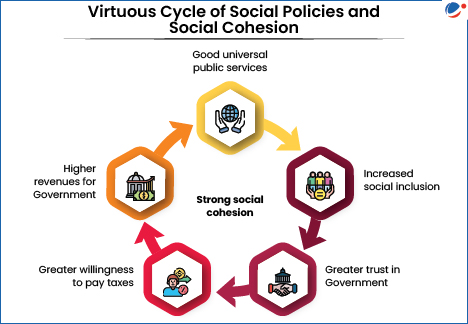The ongoing 63rd Session of the Commission focuses on “Strengthening solidarity, social inclusion, and social cohesion” as part of advancing the 2030 Agenda for Sustainable Development.
- UN Commission for Social Development is a Commission within the UN Economic and Social Council (ECOSOC) with its main responsibility is to provide advice to the UN on social development issues.

What is Social Cohesion?
- Social cohesion represents the invisible bonds that unite society, fostering harmony, and shared growth among its members.
- In socially cohesive societies, processes exist to improve inclusion of people who are in a disadvantaged situation – be it on the grounds of age, sex, disability, race, ethnicity, economic and migration status or any other factor.
- Dimensions of Social Cohesion
- It is a result of the interaction between existing levels of -
- social inclusion;
- the institutional mechanisms in place for promoting social inclusion; and
- solidarity and feelings of trust in others and in institutions.
- It is a result of the interaction between existing levels of -
- Factors undermining social cohesion include polarization, poverty, marginalization, geopolitical tensions creating an environment of uncertainty, etc.
Key Recommendations to promote Social Cohesion
- Promoting decent work;
- Provisioning of affordable healthcare;
- Implementing progressive and effective taxation systems;
- Fostering a healthy data and information environment and combating misinformation and disinformation, etc.



